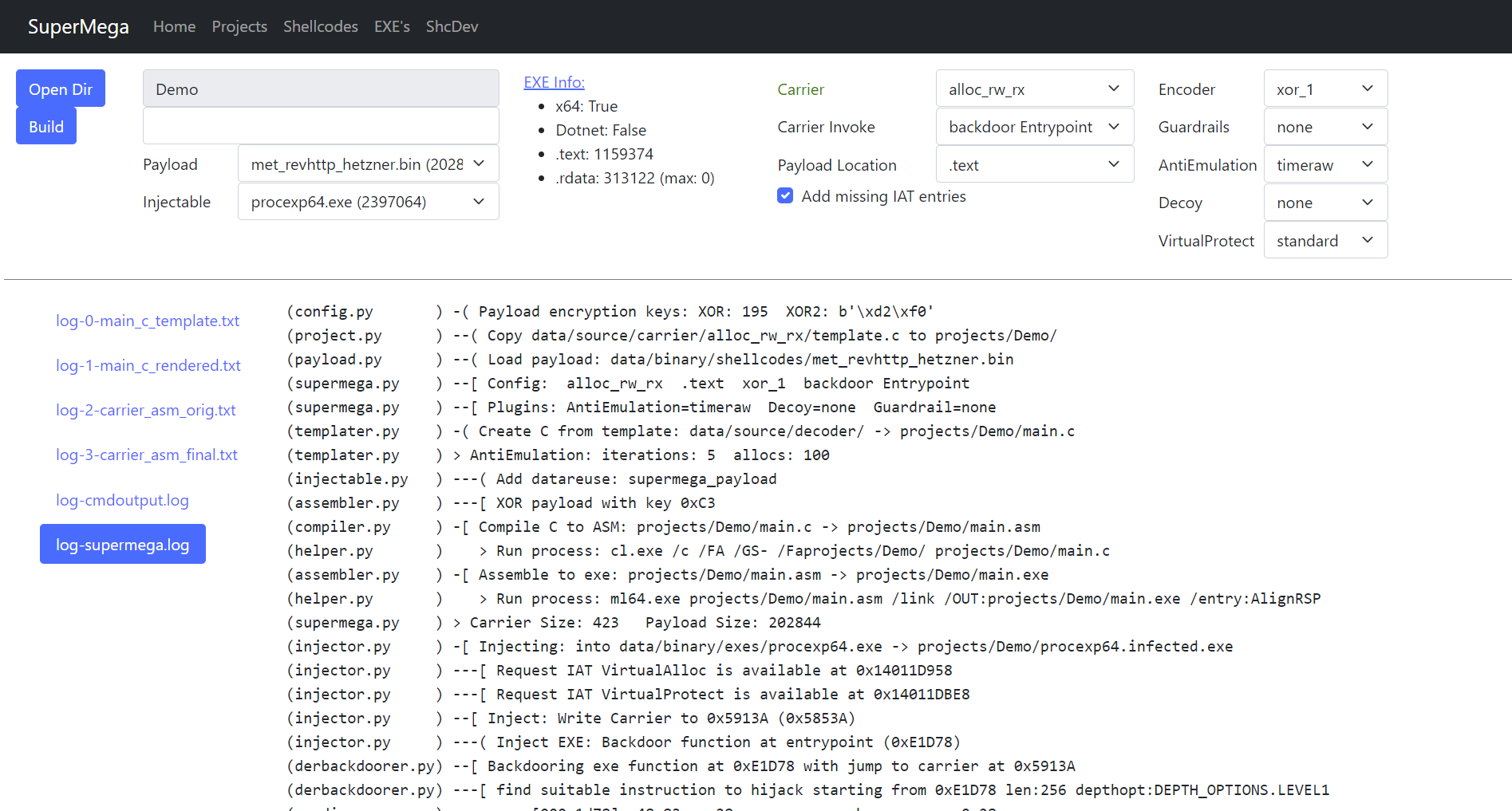https://github.com/dobin/supermega
Stealthily inject shellcode into an executable
https://github.com/dobin/supermega
injector-x64 shellcode shellcode-loader
Last synced: 9 months ago
JSON representation
Stealthily inject shellcode into an executable
- Host: GitHub
- URL: https://github.com/dobin/supermega
- Owner: dobin
- License: gpl-3.0
- Created: 2024-02-04T08:25:55.000Z (almost 2 years ago)
- Default Branch: main
- Last Pushed: 2025-02-26T08:04:33.000Z (10 months ago)
- Last Synced: 2025-04-05T03:03:51.139Z (9 months ago)
- Topics: injector-x64, shellcode, shellcode-loader
- Language: Python
- Homepage:
- Size: 3.89 MB
- Stars: 164
- Watchers: 3
- Forks: 34
- Open Issues: 5
-
Metadata Files:
- Readme: README.md
- License: LICENSE
Awesome Lists containing this project
README
# SuperMega - Cordyceps Implementation
> Ophiocordyceps camponoti-balzani is a species of fungus that parasitizes
> insect hosts of the order Hymenoptera, primarily ants. O.
> camponoti-balzani infects ants, and eventually kills the hosts after
> they move to an ideal location for the fungus to spread its spores.
## What
SuperMega is a shellcode loader by injecting it into genuine executables (.exe or .dll).
The loader is programmed in C.
The idea is that injecting shellcode nicely into a non-malicious executable should make
it less detected.
Features:
* Encrypt payload
* Execution guardrails, so payload is only decrypted on target
* Anti emulation, against AV emulators
* EDR deconditioner, against EDR memory scan
* Keep all original properties of the executable (imports etc.)
* Very small carrier loader
* Code execution with main function hijacking
* No PEB walk, reuses IAT to execute windows api functions
* Inject data into .rdata for the carrier shellcode
* Patch IAT for missing functions for the carrier
References:
* [Slides](https://docs.google.com/presentation/d/1_gwd0M49ObHZO5JtrkZl1NPwRKXWVRm_zHTDdGqRl3Q/edit?usp=sharing) HITB2024 BKK "My first and last shellcode loader"
* [Blog Supermega Loader](https://blog.deeb.ch/posts/supermega/)
* [Blog Cordyceps File injection techniques](https://blog.deeb.ch/posts/exe-injection/)

## Usage
```
> ./web.py
```
Browse to `http://localhost:5001".
Alternatively, use `./supermega.py --help`, but its not well supported.
## Directories
* `data/binary/shellcodes`: Input: Shellcodes we want to use as input (payload)
* `data/binary/exes/`: Input: Nonmalicious EXE files we inject into
* `data/source/carrier`: Input: Carrier C templates
* `projects/`: output: Project directory with all files
* `projects/default`: output: Project directory with all files
## Installation
VS2022 compilers.
Required:
* `ml64.exe`
* `cl.exe`
Optional:
* `r2.exe`
And the python packages:
```
> pip.exe install -r requirements.txt
```
### How to get the right paths
Either start the "visual studio developer console", or
use the following commandline to get all the env right.
Use this when `Cannot find Windows.h`.
```
cmd.exe /c "`"C:\Program Files (x86)\Microsoft Visual Studio\\\Common7\Tools\VsDevCmd.bat`" && powershell"
```
Also make sure radare2 is in path if you wanna use it:
```
$Env:PATH += ";C:\Tools\radare2-5.8.8-w64\bin"
```
### Alternative Path Setup
Try using:
```
"C:\Program Files\Microsoft Visual Studio\2022\Community\VC\Auxiliary\Build\vcvars64.bat"
```
or the VS developer console to find the damn environment variables, and set
it in your python console. In my case:
```
$env:INCLUDE = "C:\Program Files\Microsoft Visual Studio\2022\Community\VC\Tools\MSVC\14.37.32822\include;C:\Program Files\Microsoft Visual Studio\2022\Community\VC\Tools\MSVC\14.37.32822\ATLMFC\include;C:\Program Files\Microsoft Visual Studio\2022\Community\VC\Auxiliary\VS\include;C:\Program Files (x86)\Windows Kits\10\include\10.0.22621.0\ucrt;C:\Program Files (x86)\Windows Kits\10\\include\10.0.22621.0\\um;C:\Program Files (x86)\Windows Kits\10\\include\10.0.22621.0\\shared;C:\Program Files (x86)\Windows Kits\10\\include\10.0.22621.0\\winrt;C:\Program Files (x86)\Windows Kits\10\\include\10.0.22621.0\\cppwinrt;C:\Program Files (x86)\Windows Kits\NETFXSDK\4.8\include\um"
$env:LIB="C:\Program Files\Microsoft Visual Studio\2022\Community\VC\Tools\MSVC\14.37.32822\ATLMFC\lib\x64;C:\Program Files\Microsoft Visual Studio\2022\Community\VC\Tools\MSVC\14.37.32822\lib\x64;C:\Program Files (x86)\Windows Kits\NETFXSDK\4.8\lib\um\x64;C:\Program Files (x86)\Windows Kits\10\lib\10.0.22621.0\ucrt\x64;C:\Program Files (x86)\Windows Kits\10\\lib\10.0.22621.0\\um\x64"
$env:LIBPATH="C:\Program Files\Microsoft Visual Studio\2022\Community\VC\Tools\MSVC\14.37.32822\ATLMFC\lib\x64;C:\Program Files\Microsoft Visual Studio\2022\Community\VC\Tools\MSVC\14.37.32822\lib\x64;C:\Program Files\Microsoft Visual Studio\2022\Community\VC\Tools\MSVC\14.37.32822\lib\x86\store\references;C:\Program Files (x86)\Windows Kits\10\UnionMetadata\10.0.22621.0;C:\Program Files (x86)\Windows Kits\10\References\10.0.22621.0;C:\Windows\Microsoft.NET\Framework64\v4.0.30319"
```
### VS2022 Components
A list of packages/components which may be required for Visual Studio 2022:
* C++ 2022 Redistributable Update
* C++ Build Insights
* C++ CMake tools for windows
* C++ /CLI support for v143 build tools (lastest)
* MSBuild
* MSVC v133 - VS 2002 C++ x64/x86 build tools (latest)
* C++ ATL for latest v143 build tools (x86 & x64)
* C++ MFC for latest v143 build tools (x86 & x64)
* Windows 11 SDK